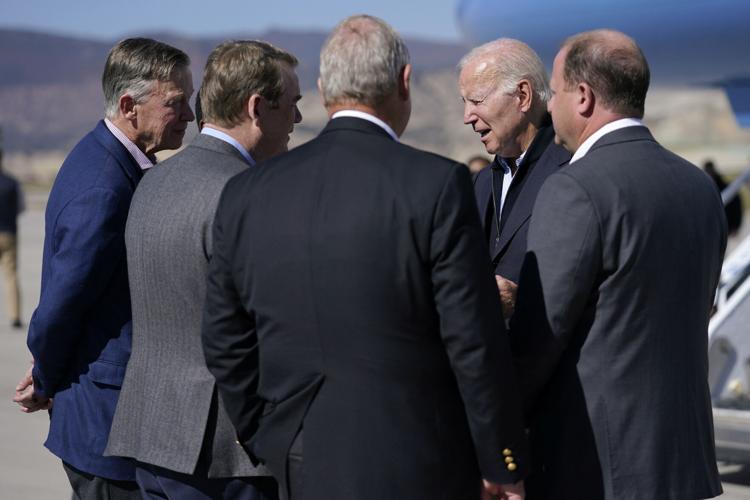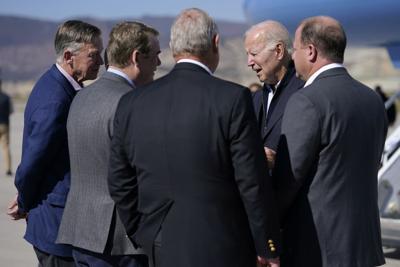Bipartisanship was the buzz word as Colorado's federal lawmakers visited the Colorado Water Congress in Steamboat Springs last week.
Both U.S. Sens. Michael Bennet and John Hickenlooper touted the funding coming from the Infrastructure Investment and Jobs Act signed by President Joe Biden a year ago and some of the projects that will benefit from that allocation.
Hickenlooper noted the progress on the Arkansas Valley Conduit, which has been in the works since the Kennedy administration. The federal legislation will put $160 million into that project, the largest allocation since the project got off the ground just a few years ago.
Hickenlooper focused his remarks on the bipartisan group of Western senators known as the Colorado River caucus and spoke about the efforts he and Bennet have been working on over the last year, as well as the effects of aridification on their work.
Shortly after the first meeting, the full effects of the massive continuing drought became apparent, Hickenlooper said. The caucus's goal is not to tell the governors of their states or water experts what to do. Instead, senators focus on how to provide "carrots" to ensure everyone would work together.
That's a lesson Hickenlooper took from Colorado's success in putting together the state's first water plan, he said.
"The real benefit is building the relationships by which people trust each other and can work together," he said. "If you thought that California and Arizona were going to work out a voluntary reduction together, a lot of people would have thought you were crazy. And yet they did it."
The U.S. Bureau of Reclamation made it clear that it has "sticks" and the agency is willing to use them if the Basin states failed to get it done, he said.
The task now is to make sure that money coming from the two federal funding bills does not get left on the table and that Colorado gets its fair share, Hickenlooper said, adding that will rely on the water community helping make that push.
U.S. Rep. Lauren Boebert, who attended the Water Congress this year for the first time since being elected in 2020, said she tries to bring awareness on the issues that matter in the West. She noted that everyone in the delegation advocated for keeping the Bureau of Land Management in her district in Grand Junction, Colorado "because we wanted boots on the ground for these policies that impact all of us."
Boebert pointed to her legislative efforts on water storage and reauthorization of fish recovery programs, and her attempts to work in a bipartisan manner with the Democrats in Colorado's federal delegation.
U.S. Rep. Joe Neguse, meanwhile, focused on collaboration and cooperation, which he said will help solve the water problems in the West. There's a third aspect, and that's urgency, the Lafayette Democrat said.
"Urgency is finally becoming apparent in Washington," he said.

Members of Colorado's federal delegation who spoke at the Colorado Water Congress on Aug. 23, 2023. Top, left to right: Sens. Michael Bennet and John Hickenlooper; bottom, left to right, U.S. Reps. Joe Neguse and Lauren Boebert.
He pointed to the two major federal funding bills, which put money toward drought relief, watershed protection and mitigation projects, with a preference for the Colorado River Basin. That does not happen without urgency, Neguse said.
Neguse pointed out he's the only member of House leadership who isn't from one of the coasts, so he does his part to advocate for the Rocky Mountain West. He also believes there's been a willingness to engage on issues that might be more relevant to the West.
"We have power in numbers if we're willing to build partnerships," he said.
House members created a bipartisan wildfire caucus with only one rule: You can only join if you bring a member of the opposing political party with you to join.
That's so far kept the caucus small, Neguse lamented, but it's been robust, with candid conversations about ways to make progress for the members' constituencies.
The West's wildfires, coupled with the wildfires from California in 2021 that pushed smoke all the way to the East Coast, was a wake-up call, Neguse said. He noted it transformed farm policy, which includes forest issues, and is part of the reason the infrastructure act included $4 billion for forestry.
Neguse said the infrastructure bill "completely changed the game" when it comes to hazardous fuel reduction projects, forest and wildfire mitigation and forest health.
"It is a down payment, in my view, but I think in our senior senator's view as well, to ensure that watersheds are protected for generations to come," Neguse said.
Boebert pointed out she voted against the infrastructure bill because only 9% of its funding went to infrastructure.
But "there were some very great things" in both the infrastructure and the inflation reduction bills, and "we have been able to secure tens of millions, possibly hundreds of millions from these, pieces of legislation for my district," she added.
Neguse pledged to the audience that the Colorado federal delegation would continue to treat the crisis with the urgency it requires, and to try to replicate at the federal level Colorado's collaboration that, he said, has defined the protection of the Colorado River for generations.
In his remarks, Bennet talked about the recent federal court decision to block the Uinta Railway project, which would have transported crude oil along the Colorado River, including in Colorado.
"The last thing we need in a 1,200-year drought is to put a bunch of oil trains" on tracks next to the headwaters of the Colorado River, he said, thanking those in the audience who have worked to block that project.
Bennet also spoke about the Arkansas Valley Conduit, his first piece of legislation when he went to the U.S. Senate in 2009. People have died waiting for clean water in the valley, he said, but thanks to the recent work the project will be finished in five years.
Sometimes generations lose track, Bennet said.
"But this is a generation that's not losing track because we've decided that we're gonna invest in America again. We're going to begin to focus on our country," he said.
Money isn't just going to the conduit. There's also $350 million for the South Platte River to help some of the poorest communities in the state who face uncertainty because of flood waters. Federal money is also helping to replace 1,000 old water meters in Greeley, updating aging infrastructure in the Leadville Mine Drainage Tunnel and Treatment Plant, modernizing the Mayville ditch, improving canals in the Grand Valley, and completing restoration and resiliency efforts throughout the San Juan national forest.
But the focus also needs to include keeping an eye on the Lower Basin states, Bennet said, making sure they spend the money to achieve permanent reductions in water use, as well as "continuing to come to the table in a way that it reflects the kind of collaboration that we're talking about."
The delegation took audience questions, among them what their most persuasive argument is for getting their colleagues to understand the uniqueness of the West, its water system and the need for water infrastructure.
Hickenlooper said he tries to bring senators from the East to Colorado at every opportunity. That recently included Sen. Bill Cassidy, R-Louisiana, who's influential on health and natural resources issues.




(0) comments
Welcome to the discussion.
Log In
Post a comment as Guest
Keep it Clean. Please avoid obscene, vulgar, lewd, racist or sexually-oriented language.
PLEASE TURN OFF YOUR CAPS LOCK.
Don't Threaten. Threats of harming another person will not be tolerated.
Be Truthful. Don't knowingly lie about anyone or anything.
Be Nice. No racism, sexism or any sort of -ism that is degrading to another person.
Be Proactive. Use the 'Report' link on each comment to let us know of abusive posts.
Share with Us. We'd love to hear eyewitness accounts, the history behind an article.